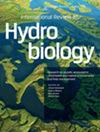大气CO2浓度和温度升高对河流凋落物分解的影响:meta分析
IF 2.3
3区 生物学
Q3 MARINE & FRESHWATER BIOLOGY
引用次数: 22
摘要
森林溪流的代谢取决于陆生植物凋落物的分解。反过来,凋落物分解的速度取决于凋落物特征、分解者活动、环境特征及其相互作用。大气变化,如大气二氧化碳浓度([CO2])和温度的增加,可能影响所有这些变量。在这里,我们报告了1993年至2017年间在全球范围内进行的41项研究的荟萃分析结果,这些研究涉及大气[CO2]升高、温度升高或两者(温度+ [CO2])对溪流中凋落物分解的影响。升高的温度显著提高了凋落物分解速率,而升高的[CO2]和温度+ [CO2]对凋落物分解速率影响不显著。温度升高的影响不依赖于研究类型(即实验室或野外研究,相关野外研究或操作野外研究),但在相关野外研究中,温度效应在纬度梯度上强于海拔梯度。温度升高的影响也不依赖于分解者群落的类型(微生物或微生物和大型无脊椎动物),但对凋落物的总分解(包括微生物和大型无脊椎动物)的影响总是显著的,而微生物驱动的凋落物分解仅在操纵研究中受到显著影响。温度升高对凋落物的影响不依赖于凋落物的特性,但对某些凋落物属有显著影响,而对其他凋落物属没有显著影响。在陆地生态系统中,温度升高会增加凋落物分解速率,而[CO2]升高会降低凋落物分解速率。研究类型(实验室或野外)和凋落物身份是陆地生态系统凋落物分解对升温和[CO2]响应的重要调节因子。土壤和河流生态系统之间的这些差异可能部分是由于这些生态系统之间的内在差异(例如在河流中不受限制的水分)。此外,我们的荟萃分析存在地理偏差,因为大多数研究是在欧洲进行的。在世界其他地区进行更多的研究可以让我们更好地了解气候变暖和[二氧化碳]增加对凋落物分解、全球碳循环和溪流生物化学的影响。本文章由计算机程序翻译,如有差异,请以英文原文为准。
Effects of elevated atmospheric CO2 concentration and temperature on litter decomposition in streams: A meta-analysis
The metabolism of forest streams depends on the decomposition of plant litter of terrestrial origin. In turn, the rate at which litter decomposes depends on litter characteristics, decomposer activity, environmental characteristics, and their interactions. Atmospheric changes, such as increases in atmospheric carbon dioxide concentration ([CO 2 ]) and in temperature, may affect all these variables. Here, we report the results of a meta ‐ analysis of 41 studies conducted worldwide between 1993 and 2017 on the effects of elevated atmospheric [CO 2 ], elevated temperature, or both (temperature + [CO 2 ]) on litter decomposition in streams. Elevated temperature significantly increased litter decomposition rates, whereas elevated [CO 2 ] and temperature + [CO 2 ] did not significantly affect litter decomposition rates. The effect of elevated temperature did not depend on the type of study (i.e., laboratory or field study, correlative field or manipulative field study) but in correlative field studies, the temperature effect was stronger over latitudinal than altitudinal gradients. Effects of elevated temperature also did not depend on the type of decomposer community (microbial or microbial and macroinvertebrates) but effects were always significant for total litter decomposition (both microbes and macroinvertebrates involved), whereas microbial ‐ driven litter decomposition was significantly affected only in manipulative studies. Effects of elevated temperature did not depend on the litter identity, although significant effects were found for some litter genera but not others. In terrestrial ecosystems, the elevated temperature was found to increase litter decomposition rates, whereas elevated [CO 2 ] decreased litter decomposition rates. Study type (laboratory or field) and litter identity were important moderators of the response of litter decomposition to elevated temperature and [CO 2 ] in terrestrial ecosystems. These differences between soil and stream ecosystems may be partially due to intrinsic differences (such as moisture that is not limiting in streams) between these ecosystems. In addition, our meta ‐ analysis is geographically biased with most studies being conducted in Europe. More studies in other parts of the world could allow for a better understanding of the effects of climate warming and [CO 2 ] increases on litter decomposition, the global carbon cycle, and biochemistry in streams.
求助全文
通过发布文献求助,成功后即可免费获取论文全文。
去求助
来源期刊

International Review of Hydrobiology
生物-海洋与淡水生物学
CiteScore
4.10
自引率
10.50%
发文量
15
审稿时长
3 months
期刊介绍:
As human populations grow across the planet, water security, biodiversity loss and the loss of aquatic ecosystem services take on ever increasing priority for policy makers. International Review of Hydrobiology brings together in one forum fundamental and problem-oriented research on the challenges facing marine and freshwater biology in an economically changing world. Interdisciplinary in nature, articles cover all aspects of aquatic ecosystems, ranging from headwater streams to the ocean and biodiversity studies to ecosystem functioning, modeling approaches including GIS and resource management, with special emphasis on the link between marine and freshwater environments. The editors expressly welcome research on baseline data. The knowledge-driven papers will interest researchers, while the problem-driven articles will be of particular interest to policy makers. The overarching aim of the journal is to translate science into policy, allowing us to understand global systems yet act on a regional scale.
International Review of Hydrobiology publishes original articles, reviews, short communications, and methods papers.
 求助内容:
求助内容: 应助结果提醒方式:
应助结果提醒方式:


